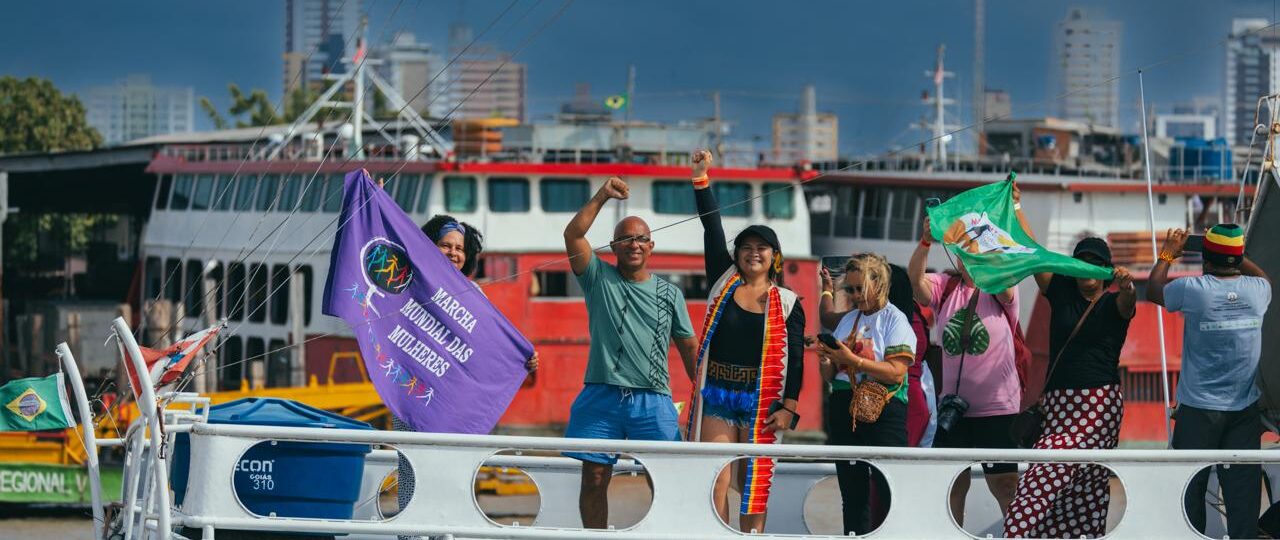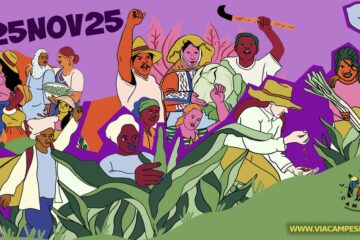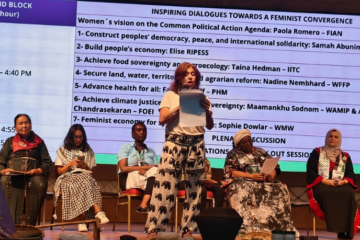For the first time in history, a United Nations conference on climate change is taking place in the heart of the Amazon. The choice of Belém as the host city for COP30 carries important symbolism, but it falls far short of resolving the profound contradictions that have marked these conferences for three decades. While negotiation rooms discuss targets and market mechanisms, in Amazonian territories and throughout the Global South, communities face the direct impacts of a development model that continues to prioritize accumulation over the sustainability of life. From a feminist perspective, the crisis of the planet is inseparable from the crisis of care. COP30, held in Amazon, exposes not only the ecological destruction caused by capitalism, but also the invisibilization of the labor, which is mostly women’s, that sustains life despite it.
The Roots of the Environmental Crisis
The climate crisis is not an isolated phenomenon, but the direct result of a capitalist mode of production that treats nature and the reproductive work of life, carried out mostly by women, as inexhaustible resources. This dual appropriation of nature and women’s labor constitutes the foundation upon which capitalist accumulation is built. The system expands and renews itself also through mechanisms such as colonization, racism, land grabbing, and land concentration.
What we call the capital-life conflict expresses this structural contradiction: as long as capital and its needs are prioritized, the sustainability of life will always be secondary.
The Corporate Capture of Climate Governance
Climate conferences have been progressively captured by what is called “multistakeholderism,” a reconfiguration of global governance where transnational corporations occupy central positions in decision-making processes, without a clear democratic basis for such participation. This phenomenon limits the scope of possible solutions to those compatible with the continuation of capitalist accumulation, emptying the sovereignty of States, particularly in the Global South.
This context is aggravated by the broader crisis of multilateralism and the United Nations system. The Security Council’s inability to respond effectively to genocides such as the one Israel is perpetrating in the Gaza Strip reveals a system that operates with double standards, prioritizing the geopolitical interests of dominant powers. For the peoples of the Global South, this crisis of legitimacy of multilateral institutions demands not just occasional reforms, but structural transformations.
Unveiling False Solutions
COP30 presents itself under the motto of “implementation,” shifting the focus from negotiating new commitments to executing those already assumed. This framing, while apparently pragmatic and necessary, tends to naturalize agreements built on foundations that reproduce structural inequalities.
The Tropical Forest Finance Facility (TFFF), expected as a major announcement at COP30, exemplifies the contradictions of false solutions. By monetizing ecosystem services of forests and structuring itself as a banking mechanism that requires constant financial returns, the TFFF transforms forest conservation into a financial asset. Sponsoring countries and private investors become creditors expecting profits, while forest countries may see their reserves converted into bond collateral, with payments subject to suspension during financial crises.
Energy transition is another central theme of COP30. However, as proposed by corporations, it keeps intact the structures of ownership and control over energy systems, and the asymmetries in the distribution of impacts. The intensified extraction of critical minerals that this transition demands reproduces historical colonial patterns, with socio-environmental costs concentrated in the South and benefits appropriated by the North.
Carbon markets, which also have centrality at COP, have demonstrated, in practice, that they allow the continuation of emissions in industrialized countries while restricting traditional communities’ access to their territories, violating rights. Documented cases reveal projects implemented without adequate consultation, and with abusive contracts that limit traditional agricultural practices fundamental to livelihoods and food sovereignty.
Feminist Economy as a Horizon of Transformation
Feminist economy, as we understand it in the World March of Women, is not simply another topic for debate, but a proposal for radical reorganization of social life. It is about placing the sustainability of life, not the accumulation of capital, at the center of economic and political decisions.
This perspective implies making care work visible and socializing it, currently attributed in a naturalized way to women. It implies recognizing the biophysical limits of the planet as non-negotiable conditions. And it implies understanding that women, especially peasant, indigenous, traditional peoples and communities, and urban periphery women, disproportionately face the impacts of environmental degradation: they are the ones who walk greater distances when water sources are contaminated, who guarantee family food even with agribusiness advancing over territories, who reorganize communities after extreme climate events.
Building the People’s Summit
In response to the official COP, social and popular movements are building the People’s Summit as an autonomous space for articulation and struggles. Organized around six axes of convergence, the Summit synthesizes agendas that movements already build daily in their territories.
Axis I. Living Territories and Seatories, Popular and Food Sovereignty: Defends the protection of territories and rights of peoples of waters, forests, and fields, demanding demarcation of indigenous lands and titling of traditional communities. Proposes Popular Agrarian Reform and the construction of agroecological territories to guarantee food sovereignty, in addition to recognizing Nature as a subject of rights and valuing ancestral knowledge.
Axis II. Historical Reparation, Combating Environmental Racism, False Solutions, and Corporate Power: Confronts large agribusiness and mining projects, rejecting false climate solutions based on the financialization of nature. Demands cancellation of Global South countries’ debt, payment of the North’s ecological debt, holding corporations accountable for environmental crimes, and reparation policies for peoples.
Axis III. Just, Popular, and Inclusive Transition: Defends the inclusion of all workers in formulating the Just Transition struggle agenda. Addresses the central role of women in caring for territories and the need to center the reproduction of life in our proposals. Proposes decentralized energy democracy, agroecological transition, strengthening of popular territorial economies, guaranteeing labor rights and combating precariousness.
Axis IV. Against Oppressions, for Democracy and Internationalism of Peoples: Strengthens popular internationalism, building mobilization for peace and climate justice, combating the extreme right, free trade agreements and criminalization of migrants, promoting reparation to the most affected peoples and popular power around the world.
Axis V. Just Cities and Living Urban Peripheries: Develops urban policies to confront the climate crisis in peripheries, combating environmental racism. Proposes just urban planning, recycling buildings for popular housing, democratization of sanitation and energy, expansion of vegetation cover, and decent work in cities.
Axis VI. Popular Feminism and Women’s Resistance in Territories: Building popular feminism, anti-racist, anti-colonial, and for sexual and gender diversities. Organizing resistance against the advance of militarism and colonial domination over women living in occupied territories, under apartheid, and in wars. Strengthening the construction of Feminist Economy against neoliberal economies.
Building Popular Convergences Beyond COP30
The Global Climate March, on November 15, will materialize the presence of movements in the streets, making our proposals visible and denouncing the false solutions proposed in the official COP space. The context in which we live requires strengthening the internationalist and anti-militarist perspective in demonstrations, particularly in the face of the growing militarization of the climate issue, which serves to guarantee corporate access to strategic minerals and repress territorial resistance, and the deepening of conflicts and genocides around the world. With the expansion of military bases, security cooperation agreements, and joint operations under the pretext of combating drug trafficking and terrorism, the United States intensifies its military presence in Latin America, perpetuating a logic of geopolitical control that threatens the sovereignty of peoples, criminalizes social movements, and legitimizes interventions that have historically served corporate interests in the region.
What we feminists want is to highlight the internationalist solidarity that is already practiced within our organization and how women around the world not only point out solutions, but practice daily, forming the force that sustains life in a world suffering from wars, poverty, and extreme weather events.
COP30 may, at best, produce incremental advances in its official negotiations. The transformation necessary to effectively confront the climate crisis will depend on the movements’ capacity to strengthen their organizations, expand articulations, and build popular power capable of imposing structural changes. In our territories, we are already building, today and always, our alternatives to the dominant model.

Natália Lobo, Diovana da Silva and Sophie Dowlar are militants of the World March of Women in Brazil and Kenya.




